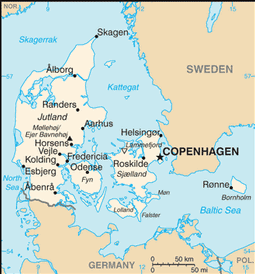Denmark

About the Flag
Denmark is a constitutional monarchy situated in Northern Europe bordering the Baltic and North Seas on a peninsula north of Germany. With its capital in Copenhagen, Denmark is ruled by the Prime Minister and unicameral parliament with the Queen as the Head of State. Danish is the chief language, and the legal system is based on civil law. Denmark is a member of the UN, EU, OECD, NATO, and the IMO.
The Danish economy is highly developed with high-tech agriculture, modern small scale, corporate industry, and comfortable living standards. It is self-sufficient in food and energy production and exports meat and dairy products as well as chemicals, pharmaceuticals, industrial machinery and various services (including shipping). The unit of currency is the Danish krone (DKK) and Denmark has not joined the monetary union of EU. Denmark’s major trading partners are the EU, Norway, and the United States.
The nation maintains two registries:
The Royal Danish Register of Shipping is the traditional, national register reserved for ships of Danish ownership which are home-ported in the country.
The second register, the Danish International Ships Register (“DIS”), was created by Act of Parliament No. 408 of July 1, 1988 (currently Executive Order no. 460 of April 11, 1997). Like the traditional registry, the DIS is reserved primarily for Danish owners, but the difference is in the degree to which foreign interests are allowed to participate in management and ownership of the shipping company, the types of eligible vessels, geographical and trade restrictions on activity, cabotage, taxation, and crewing issues. In particular, under the DIS, Danish shipowners may operate ships with a crew not subject to Danish national collective agreements but on international competitive terms.

